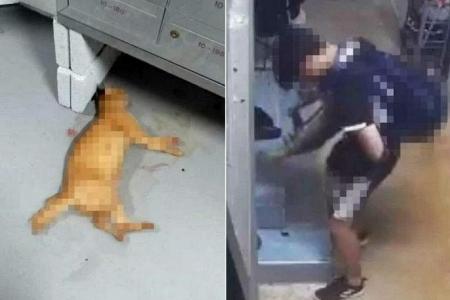Call for more to be done to protect cats after ‘disproportionately high number’ of abuse cases in 2023
After Ms Umi Solikati found the mangled carcass of a black cat at the void deck of her Housing Board block in Boon Lay, she started patrolling the area in fear that more felines would be abused.
She had been feeding the cat named Panther every day for about 11 years, until it met its fate when a boy allegedly threw it off the 22nd storey of the block in December 2022.
On March 30, another cat was found dead - seemingly beaten to death - some 350m away from her block.
“I’m very afraid that more cats will be abused. Sometimes I walk around till past midnight looking out for the cats,” Ms Umi, 39, told The Straits Times.
“When I’m at home, if I hear something, such as a cat yowling like it’s in danger, I’ll quickly run outside to see what’s going on.”
These two instances of suspected animal cruelty are among several cases that have made headlines in recent months.
On April 11, a teenage boy was arrested after a video showing him trying to perform obscene acts on a tabby cat in Bukit Panjang went viral.
In February, the court heard a 31-year-old man faces charges of abusing five cats in Ang Mo Kio, including throwing two down from HDB blocks and stomping on a cat’s neck.
‘Disproportionately high number’ of cat abuse cases in 2023
Society for the Prevention of Cruelty to Animals (SPCA) executive director Aarthi Sankar said the organisation has observed a “disproportionately high number” of cat abuse cases in 2023.
It investigated 11 such cases from January to March. In comparison, it probed 16 cases in the whole of 2022 and 11 cases in 2021, she said.
Cat Welfare Society (CWS) president Thenuga Vijakumar said there has been a rise in numbers due to increased vigilance and caution, as well as reporting. But she added: “I would rather there be over-reporting than under-reporting because at least we have a fuller picture.”
She pointed out that CWS has expanded its role beyond rescuing cats - it also consistently advocates for felines.
She said: “CWS has taken on the role of gathering information, educating and pushing for vigilance for such cases. We also do the grunt work, such as appealing for information and pursuing the matter with AVS on a fortnightly basis.”
A cat rescuer, Ms Jenny Lim, 49, said that social media has allowed people to shed light on abuse cases, and rescuers like herself are able to gather more accounts from witnesses.
One of the worst abuse cases she handled in 2022 involved a cat that had lacerations and open wounds, and parts of its skin had fallen off.
“The cat was in very poor condition and we suspected it was starved by its fosterer. It weighed only about 1kg when we finally put it to sleep,” said Ms Lim, the founder of 2nd Chance Shelter.
“Some people hate cats and don’t care about them. But why vent out their frustrations on innocent cats?”
Ms Jessica Kwok, group director of the Animal and Veterinary Service (AVS), said it received an average of 1,250 reports of alleged animal cruelty and abuse each year from 2019 to 2022.
Of these, about 60 cases each year were related to animal cruelty. Offenders were issued warning letters or composition fines, or prosecuted in court in egregious cases, she added.
Ms Thenuga noted that some of the cases involved multiple cats, such as the high-profile case of a man who slashed 11 cats in Ang Mo Kio in 2021.
Frustration on the ground
An seasoned cat rescuer, who wanted to be known only as Ms Wati, expressed frustration that more has not been done to protect the animals.
The 50-year-old education consultant, who has been rescuing animals for 10 years, added: “We’ve come to a point where there has to be real action - enough has been done to educate the public. These cases show that enforcement and deterrence are not effective enough.
“These perpetrators, they know what they are doing.”
CWS’ Ms Thenuga echoed the sentiment, saying that while there might be more reporting of abuse, “what we’re not seeing is what happens after a report is made”. This has led to frustration because there is “no clarity on what investigative steps (the authorities) are taking and it is unclear if they are acting fast enough”.
“Maybe a balance needs to be struck such that organisations like SPCA and CWS, who are the middle men with caregivers, have an awareness and can assure the caregivers on their behalf,” she said.
But Ms Kwok said AVS, which is part of the National Parks Board, takes all cases related to animal welfare seriously, and investigates all feedback. “We will take appropriate enforcement action against anyone who does not provide adequate care for their pet or commits an act of animal cruelty,” she said.
She explained that investigations into cases of animal cruelty and poor animal welfare are often complex. Among the challenges are a lack of eyewitnesses and direct evidence, and cases being reported late or not being reported at all.
Sometimes, carcasses had already been disposed of or were found to be in bad condition, “making post-mortem analyses impossible”, she added.

What can be done?
Those on the ground are calling for more to be done to educate the public.
Ms Thenuga said AVS could play a part to educate students in schools on caring for community animals and responsible pet ownership, or fund an animal welfare group to do so.
CWS is planning to launch a curriculum for schools in the second half of 2023 to fill this gap, but it will be up to individual schools to bring this to their students, she added.
“If we had funding, we could hire a full-time education executive to go to every school and run a programme, assembly talks, or even mentor tertiary students for their projects.”
AVS said it has various platforms to raise awareness about animal welfare and responsible pet ownership. These include Pets’ Day Out events, a webinar series, talks, roving exhibition panels and school plays.
Students can also go on a learning journey to AVS’ animal classroom with rescued animals at Jacob Ballas Children’s Garden to learn about keeping pets.
Meanwhile, SPCA has appealed to parents to do more. “We urge parents and educators to underscore to their children the importance of treating all animals as sentient beings,” said Ms Sankar.
In October 2022, it launched an ambassador programme for youths which empowers them to raise awareness about animal abuse and cruelty.
Some cat caregivers are taking matters into their own hands.
A caregiver in her 50s, who wanted to be known only as Ms Joan, said she saw a group of children throwing stones at community cats in Tiong Bahru some years back.
At the time, her team of three caregivers stopped the children from doing so and explained that they should not mistreat community cats.
“We took pains to resolve the issue before it escalates. One of our caregivers even alerted the principal of their school,” she said.
“It seemed excessive then but with the recent incident of a minor throwing a cat over the parapet, the hindsight of nipping the problem in the bud would be effective now.”
On deterrence, Ms Sankar said the SPCA works closely with other animal welfare groups and the authorities to lobby for stiffer penalties that match the gravity of the abuse.
“These penalties will help deter potential abuse... Every instance of abuse and cruelty is a grave cause for concern,” she said.
“We share this world with other sentient beings, and it is our collective responsibility to treat them with dignity, compassion and respect.”
Get The New Paper on your phone with the free TNP app. Download from the Apple App Store or Google Play Store now



